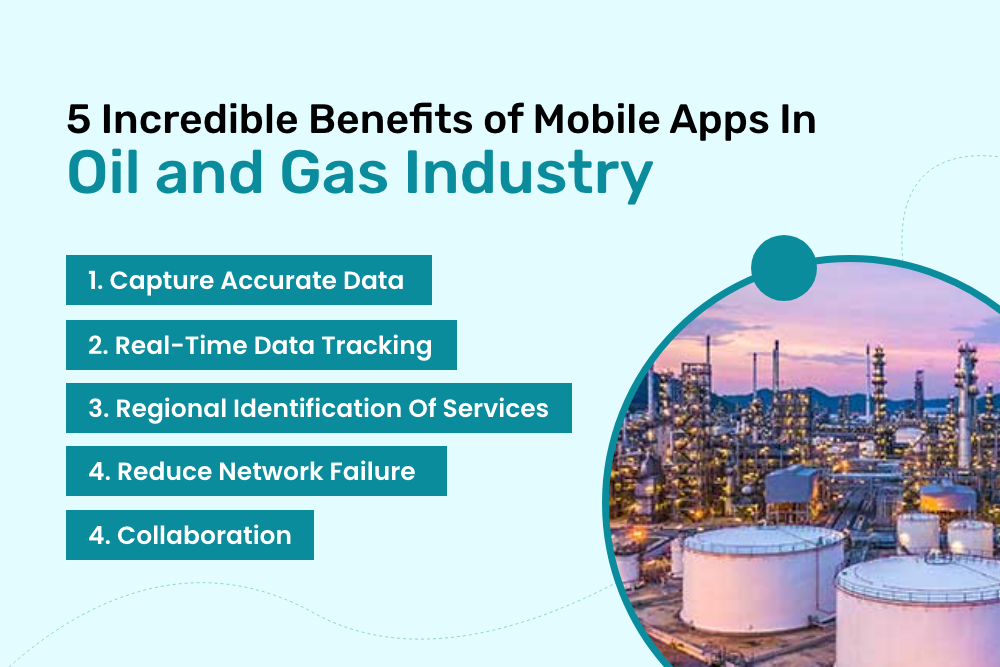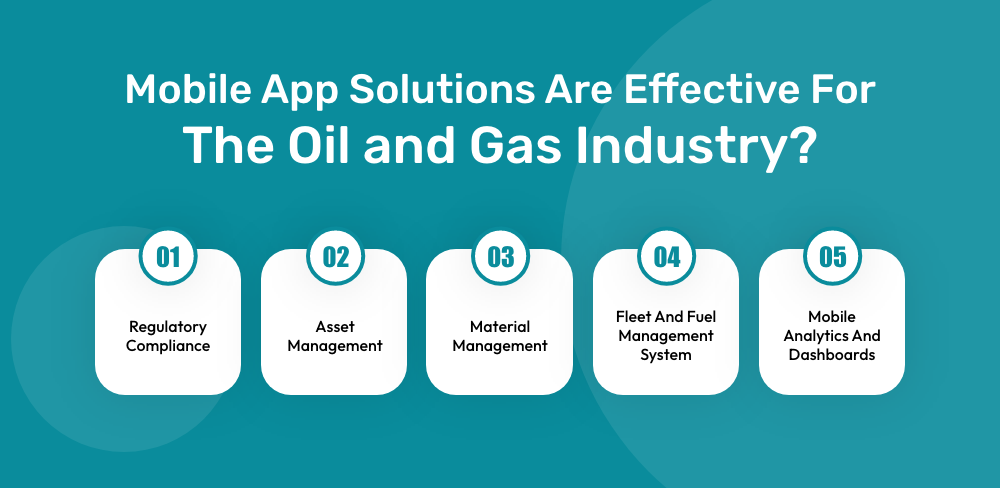The oil and gas industry’s growth over the past decades can be attributed mainly to significant advances in automation. The sector is experiencing a massive boom in spending on mobile applications. Mobile apps in oil and gas industry significantly revolutionize how companies manage their operations, and increase efficiency and productivity.
With technological advancement, mobile applications have become indispensable tools, streamlining the process and improving communication in the industry. The Oil & Gas Sector has been majorly reliant on old techniques of operation.
However, with the advancement of technology and mobile apps, the industry is experiencing a significant shift in how it conducts business. In 2024, mobile apps are set to revolutionize how the oil and gas industry operates, providing many benefits. Continue reading the blog to learn what you want to know about mobile apps in oil and gas industry.
How Mobile Apps Help the Oil and Gas Industry to Deliver Improved Productivity?
Oil and gas businesses invest in custom software development to improve communication, increase business growth, and get real-time visibility across the business. Mobile applications enable the workforce to be more productive and reduce operational costs.
- According to statistics, companies in the industry invested approximately $185 billion in mobile app development in 2021.
- Moreover, the investment was increased by $195 billion in 2022.
- According to com, the oil and gas application market is predicted to grow to $9.4 billion by 2024.
App development companies usually prefer advanced and innovative technology, such as the Internet of Things (IoT) and Artificial Intelligence (AI), to provide the oil and gas industry with the most suitable IT solution. Adopting modern technologies encourages the industry to explore more mobile app solutions that allow access, monitoring, and manipulation of the tech. The oil and gas industry has changed to the next level thanks to mobile apps.
How Oil and Gas Applications Optimize Upstream, Midstream, and Downstream Operations?
Are you looking to develop an on-demand fuel delivery app? Then this section will tell you a lot about it. As we all know the industry is divided into three main sections based on operational area: Upstream, Midstream, and Downstream. Let’s examine each operation individually.
1. Upstream
Upstream-based companies explore the existence of underground crude oil and gas. Sub-industries in this section extract all the available resources using required machinery and digging wells. This extremely labor-intensive process makes it attractive for automation solutions. Oil and gas software development companies are creating mobile apps for fieldworkers to streamline data, provide accurate time information, and facilitate better decision-making, ultimately improving productivity and cost savings upstream.
2. Midstream
“Midstream” describes the process of transporting oil, natural gas, and other products to production sites. Oil and gas are extracted, transported, and sold in this segment. Companies operating in this segment are responsible for maintaining the pipelines and transporting the gas and oil to different regions. Mobile Apps help the segment create reports based on data gathered from assets. Track changes made to the assets, and share the data with other team members in a real time.
3. Downstream
This segment primarily aims to refine petroleum crude oil and process & purify raw natural gas. Some of its apparent products include diesel, gasoline, heating oils, jet fuels, and asphalt for building roads. Downstream is being revolutionized by adopting mobile apps, as Android app development companies are creating innovative solutions to improve safety and efficiency. Apps can handle each and every data for different departments.
5 Incredible Benefits of Mobile Apps In Oil and Gas Industry
In today’s changing world of oil and gas industry, adopting advanced technologies has become a must. In this regard, mobile apps stand out as a powerful force. Offering real-time data tracking, accurate data capturing, and speed network, the mobile apps in oil and gas industry have the potential to revolutionize the industry’s operation.

Digitalization through the app’s development has the potential to revolutionize the industry along with numerous advantages mentioned below:
1. Capture Accurate Data
In the oil and gas industry, fieldworkers (managers, geologists, derrick hands, and others) are responsible for capturing accurate data as soon as possible. The traditional data capture method could have been more efficient for collecting useful information and boosting productivity. Over time, advanced technologies have replaced the conventional method. Now, tablets and mobile apps in oil and gas industry enable fieldworkers to get information conveniently and save time to do other work, increasing their output.
2. Real-Time Data Tracking
Real-time data tracking is essential for the oil and gas industry as it provides actionable insights and the ability to respond swiftly to changing circumstances. Custom software development services help companies manage their oil supply chain, linked to a centralized dashboard. Communication technology allows business to monitor the exact location of their vehicles.
3. Regional Identification Of Services
Oil and gas businesses own expensive and heavy machinery, equipment, and other tools, which are beneficial assets. These assets allow the business to drill, explore, refine, and supply products. Companies require good-quality equipment for the task because even minor errors can result in heavy losses. Therefore, the assets are properly inspected, tracked, and maintained.
4. Reduce Network Failure
Network breakdown is a critical challenge in the industry, making data gathering and sharing difficult. Mobile applications with offline capability help to increase connectivity and reduce network failure. Mobile apps in oil and gas industry are adequate for capturing and syncing data automatically, even if they are out of range.
5. Collaboration
Oil and gas businesses are vast, and various people must collaborate. In such circumstances, mobile apps facilitate effective collaboration. Engineers, operators, and other executives collaborate significantly on projects since several businesses operate across different nations. Mobile apps enhance an effective partnership by allowing them to send real-time information and receive feedback immediately.
How Mobile App Solutions Are Effective For The Oil and Gas Industry?
In the current digital age, the app solution has become the most crucial part of the business operations. There are several types of mobile app solutions that can be developed for the oil and gas industry based on specific requirements. A few of them are discussed here:

1. Regulatory Compliance
Several oil and gas businesses manage and report on compliance discreetly, such as by region, business unit, and functional area; therefore, the mobile app solution accelerates compliance operations by enabling precise monitoring and expedited reporting on safety and regulatory issues.
2. Asset Management
It’s critical to the oil and gas industry to provide a defined methodology to design, operate, and maintain assets cost-effectively. Asset management allows quick response to unexpected risks and early preventive maintenance. Oil and gas app development focuses on assessment management, allowing businesses to track and monitor their assets in the field. With features like equipment tracking, maintenance scheduling, and real-time data collection, the mobile app solution streamlines operations and improves oil and gas industry efficiency.
3. Material Management
It digitalizes the plant construction practically and optimizes the material’s flow from manufacturing to installations. Mobile apps are applied for material management features such as reordering, procurement, stock transfer orders, collecting, quality assurance, and quality control inspection.
4. Fleet and fuel management system
Judicious and precise inventory insights help improve order fulfillment by lowering operational and fuel costs and enhancing the customer experience with a mobility solution for truck drivers, making them work remotely.
5. Mobile Analytics And Dashboards
Mobile analytics-based app solutions assist precise monitoring of key business indicators, with operation dashboards and executives facilitating a real-time insight to inform effectual decision-making. In upstream situations, consumers can monitor drilling operations using smartphones from anywhere. Logging online lets customers access a snapshot of the drilling operation with mud weight, job cost, and operations summarized and uploaded to the mobile apps.
How Can Dev Technosys Assist You In Mobile App Development?
The oil and gas industry is gaining a competitive edge and enjoying various benefits from mobile app development services. The apps provide real-time monitoring and data collection in upstreams, allowing for more efficient exploration and drilling operations.
The apps enable streamlined logistics, inventory management, and maintenance scheduling in the midstream and downstream segments, ultimately improving operational efficiency and reducing downstream.
Furthermore, mobile app solutions ensure regulatory compliance, condition monitoring, inspection, and sound assessment. At Dev Technosys, we provide top-notch Android and iOS mobile app development services for various industrial purposes. We have served numerous industries worldwide, and we would be delighted to take on new projects.
Frequently Asked Questions
1. How Do Mobile Apps Impact The Oil And Gas Industry?
With the advent of advanced technologies such as IoT and AI, mobile apps in oil and gas industry have enormously impacted its operation. Mobile applications enable industry to digitize their procedures and operations, and these technologies help to explore different mobile app solutions to improve productivity.
2.What Are The Key Sections/Segments Of The Oil And Gas Sector?
The oil and gas industry has broken into mainly three segments:
- Upstream: It consists of companies involved in oil and gas exploration and production. These businesses search the world for reservoirs of raw material to drill for extracting that material.
- Midstream: This segment is focused on ison transportation and is responsible for moving all the extracted raw materials to refineries to process the gas and oil. Trucking, pipelines, shipping, and the storage of raw materials characterize these businesses.
- Downstream: The downstream-based businesses are the refineries and gas stations. These are responsible for removing all the impurities and converting the gas and oil to products for the general public, such as asphalt, heating oil, and gasoline.
3. What Are Critical Mobile App Development Solutions In The Oil And Gas Industry?
- Assets and materials: These are crucial parts of the industry. Collecting process data for asset tracking and inventory management is insufficient and prone to error. Cut costs and save time with customized mobile asset material management applications.
- Regulatory compliance: It conducts operations in different regulatory and tax regimes and go hand in hand with certainty without any unnecessary result regardless of ecological energy, geopolitical, and natural resources supply and business environment.
- Mobile workforce: The growing prevalence of mobile, virtual desktop, and secured Wi-Fis have enabled the latest mobile workforce opening for SMBs, startups, and enterprises. This app development ensures real-time tracking, managed mobility services, and productivity management.
4.What Is An On-Demand Fuel Delivery App?
This application enables the users to order gas refilled directly to the selected location and at a set time. Hence, it’s an efficient and new way for refueling generators or vehicles that do not involve driving to traditional gas stations.



















